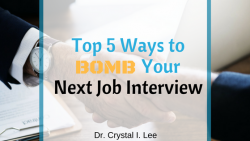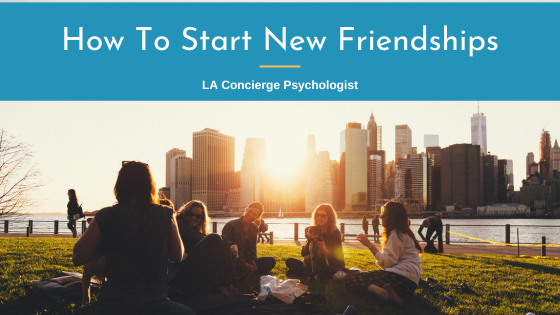Interviews are the time to really shine and win over your new potential boss. This is your first real impression, and you want it to be positive. I originally wrote this article many years ago after going through a hiring process where I interviewed dud after dud. A shockingly high number of people forgot basic aspects of interviewing. And it makes a big difference. If I only have 30 to 60 minutes to get to know a person, you better believe that I pay attention to all the data at my fingertips!
1. Dress Inappropriately
How you’re dressed is one of the first pieces of data an interviewer sees. Before we even speak to one another, I see your physical presentation. I make judgments (rightly or wrongly) based on what I see. You don’t want me distracted by your outfit before you can dazzle me with your personality!
When it comes to interviews, it is better to be overdressed than underdressed. Overdressed says, “I’m taking this very seriously, and I want to impress you.” Underdressed says, “I don’t care.” Also, if you dress inappropriately for something as formal as a job interview, it makes me question, not only your common sense, but also how appropriate you would be when I’m not around.
Your best bet is to wear a suit. That is the ultimate “dress to impress” outfit. If you don’t own a suit, nice slacks and a professional-looking shirt work as well. A professional-looking shirt is a nice, somewhat conservative blouse or button-up collared shirt. I know some people advise to wear something that is memorable. However, make sure that you are remembered fondly and not as the interviewee with questionable fashion sense.
2. Forget a Copy of your Resume
When it comes to interviewing, you want to be a boy scout: be prepared. That means you should have at least one copy of your resume on hand when you go to the interview. Chances are the interviewer won’t ask for a resume because they already have a copy. However, if the interviewer doesn’t have your resume printed and asks you for one, you better have one. You don’t want to look under-prepared.
Sometimes interviewers will purposefully not have a copy of your resume on hand and ask you for a copy, just to see how prepared you came for the interview. I’m most impressed when an interviewee offers me a copy of their resume without me having to ask. This communicates the interviewee takes initiative, is well organized, and is well prepared. Definitely characteristics you want in an employee!
3. Know Nothing about the Job or Company
As an interviewer, I don’t expect the interviewee to know all the ins and outs of the position or company. However, I do expect the interviewee to know the basics. If I sense that the interviewee blindly applies to any and every job, then I don’t take the candidate seriously.
Make the interviewer feel like this job is the job for you. Ways to do that is to drop in little hints that you’ve visited the company website, that you’ve done some research about the company or job, or how you think your skills would be beneficial to the company or job. Trust me, interviewers will take notice and appreciate that you took the time to do your research.
4. Answer Questions Incoherently
There will inevitably be some questions that you will hear and think, “Oh crap. I have no clue how to answer that!!!” If that’s the case, don’t try and answer the question right away. You will likely talk in circles, ramble, or be incoherent. As an interviewer, I will think you’re unqualified, spacey, or, worse, dumb.
Instead, take a breath, and say something like, “Wow, that’s a good question. I’m going to give that some thought.” Then take a few moments to gather your thoughts and create a coherent answer. As an interviewer, I will view you as someone who is thoughtful and not impulsive. And when you give your awesome, logical, coherent answer, I will view you as really intelligent and right for the job. Now, don’t take too long to think— just a few moments, not a few minutes.
Also, prepare to answer common interview questions. Before the interview, brainstorm questions the interviewer might ask and then formulate how you might respond. If an interviewee can’t answer basic questions, a red flag immediately raises. So prepare for basics like, “tell me about yourself”, “what are your strengths and weaknesses?”, or questions regarding your experience and resume.
Check out my tried and true method for preparing for interviews.
5. Don’t Ask Any Questions
With most interviews, the interviewer asks if you have any questions. The wrong answer is “no”. Always, always, always ask questions! This communicates several things to the interviewer:
- You’re prepared.
It’s hard to think of questions off the top of your head, and an interviewer can tell if you’re asking random questions that are popping into your head at the moment. - You’re interested in the job.
Think about when you’re getting to know someone. If that person never asked you a single question about yourself, would you feel like they’re interested in you? - You’re thoughtful.
Coming up with good questions requires time, energy, and a level of thoughtfulness. Impress us with how thoughtful you are by asking a great question.
A good, thoughtful question will help you stand out in a positive way. Most importantly, you should ask questions that will help you decide whether or not this is the right job for you.
Did you know Dr. Crystal I. Lee has interviewed over 100 potential candidates while on hiring committees and as directors of programs? Contact Dr. Lee to get her expert support in preparing for your next job interview.




